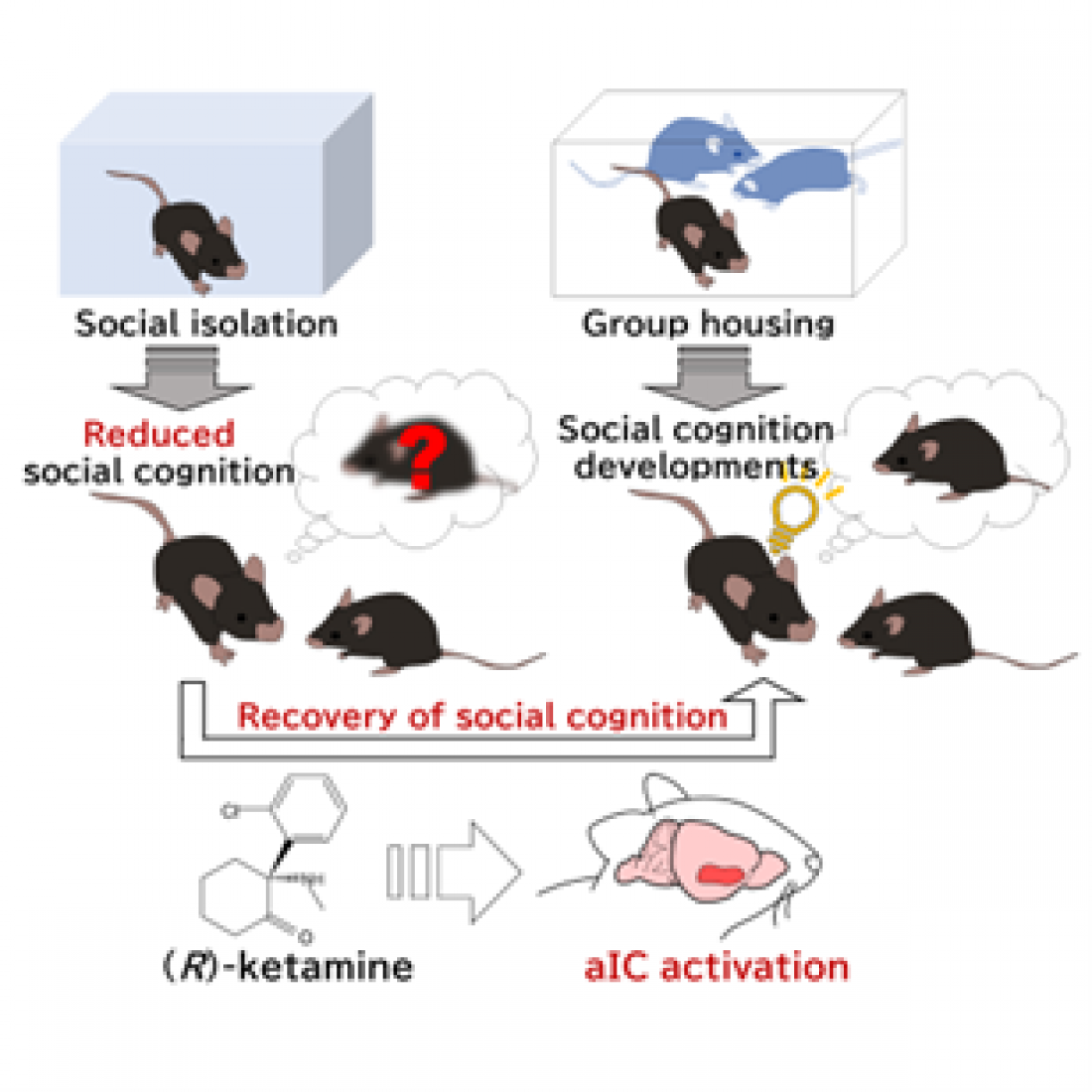The reduced social cognitive function exhibited by mice raised in social isolation rearing was improved through the activation of the insular cortex by (R)-ketamine.
Researchers from Osaka University find that one form of ketamine, a common anesthetic, can improve social impairments in a mouse model of depression by restoring neuronal activation in a specific brain region
Osaka, Japan – Well-being is important for everyone, especially when we feel lonely or isolated. Depression is a serious challenge for many people and finding an effective solution is key.
In a recent study published in Molecular Psychiatry, researchers from Osaka University used a mouse model of depression to reveal that one form of ketamine (a common anesthetic) in low doses can improve social impairments by restoring functioning in a specific brain region called the anterior insular cortex.
Ketamine is often used at low doses to treat depression, but its actions in the brain remain relatively unclear. Generally, ketamine refers to a mix of two different forms of ketamine: (S)-ketamine and (R)-ketamine. These two molecules are mirror isomers, or enantiomers—they have the same molecular formula, but their three-dimensional forms are mirror images of one another. Although they usually occur as (S) and (R) pairs, they can also be separated into either (S)-ketamine or (R)-ketamine. Each is beneficial in treating depression, although their specific effects vary.
When the research team decided to test the effects of (S)-ketamine and (R)-ketamine on depression-like symptoms in mice, they first had to decide on an appropriate model. Given that depression and social impairments can be induced by long-term social isolation, they chose a chronic (at least 6 weeks) social isolation mouse model.
The researchers then used a method that allowed them to directly compare neuronal activation throughout the entire brains of mice treated with (S)-ketamine, (R)-ketamine, or saline (as a control) directly after behavioral tests.
“In this way, we were able to observe differences between (S)-ketamine and (R)-ketamine treatments in terms of neuronal activation across the whole brain, without having a predefined hypothesis,” says lead author of the study Rei Yokoyama. “Notably, we found that chronic social isolation led to decreased neuronal activation in the anterior insular cortex—a brain region that is important for emotional regulation—during social contact, and that (R)-ketamine, but not (S)-ketamine, reversed this effect.”
The researchers also found that mice treated with (R)-ketamine were better at recognizing unfamiliar versus familiar mice in a social memory test, indicating improved social cognition. Moreover, when neuronal activity was suppressed in the anterior insular cortex, the (R)-ketamine-induced improvements disappeared.
“These findings highlight the importance of the anterior insular cortex for the positive effects of (R)-ketamine on social impairments, at least in mice,” says Hitoshi Hashimoto, senior author of the study. “Together, our results indicate that (R)-ketamine may be better than (S)-ketamine for improving social cognition, and they suggest that this effect is dependent on restoring neuronal activation in the anterior insular cortex.”
Given that the rates of social isolation and depression are increasing worldwide, these findings are very important. (R)-ketamine is a promising treatment for isolation-induced social impairments and may contribute to a better quality of life in people with associated disorders.
###
The article, “(R)-ketamine restores anterior insular cortex activity and cognitive deficits in social isolation-reared mice,” was published in Molecular Psychiatry at DOI: https://doi.org/10.1038/s41380-024-02419-6
About Osaka University
Osaka University was founded in 1931 as one of the seven imperial universities of Japan and is now one of Japan's leading comprehensive universities with a broad disciplinary spectrum. This strength is coupled with a singular drive for innovation that extends throughout the scientific process, from fundamental research to the creation of applied technology with positive economic impacts. Its commitment to innovation has been recognized in Japan and around the world, being named Japan's most innovative university in 2015 (Reuters 2015 Top 100) and one of the most innovative institutions in the world in 2017 (Innovative Universities and the Nature Index Innovation 2017). Now, Osaka University is leveraging its role as a Designated National University Corporation selected by the Ministry of Education, Culture, Sports, Science and Technology to contribute to innovation for human welfare, sustainable development of society, and social transformation.
Website: https://resou.osaka-u.ac.jp/en



